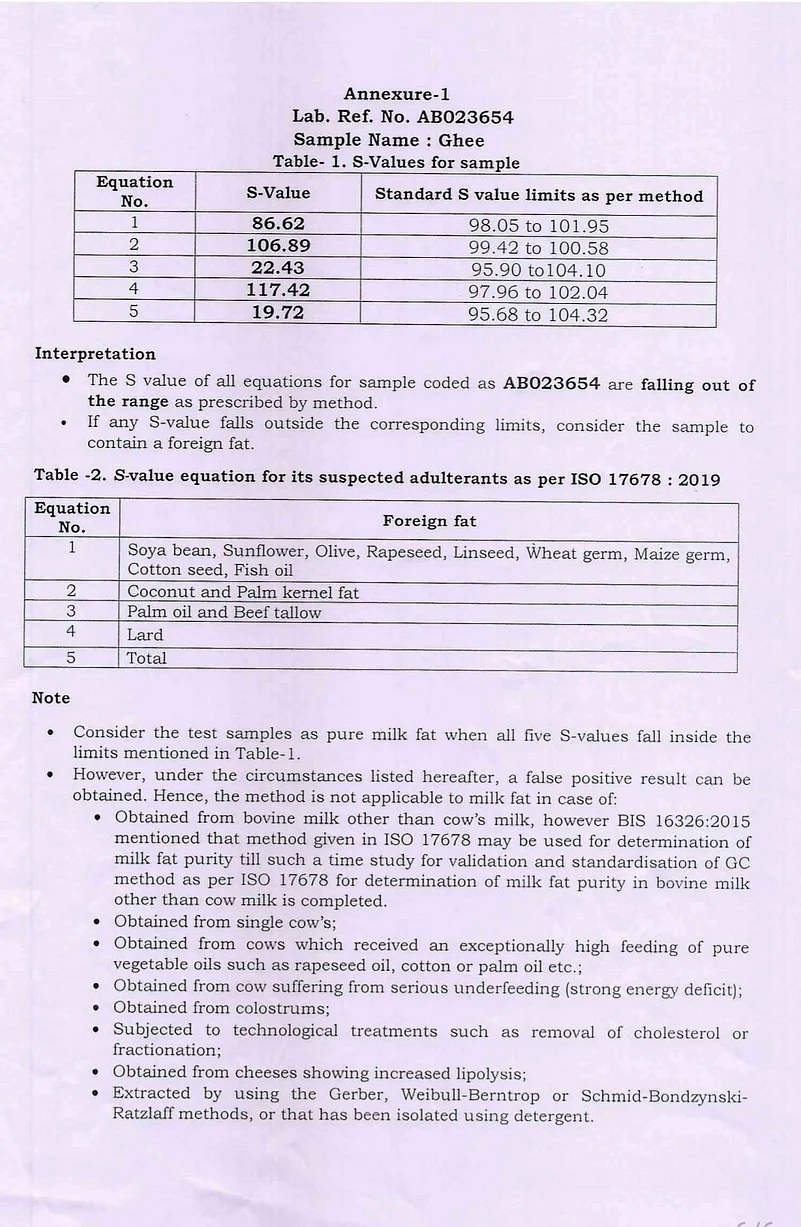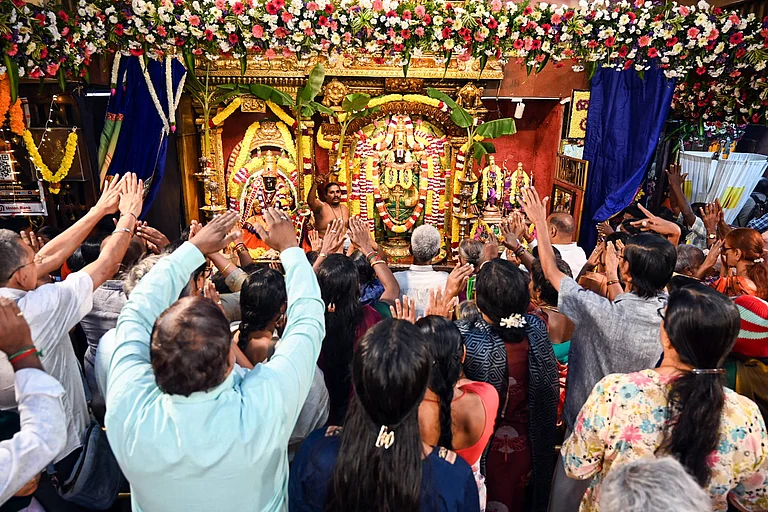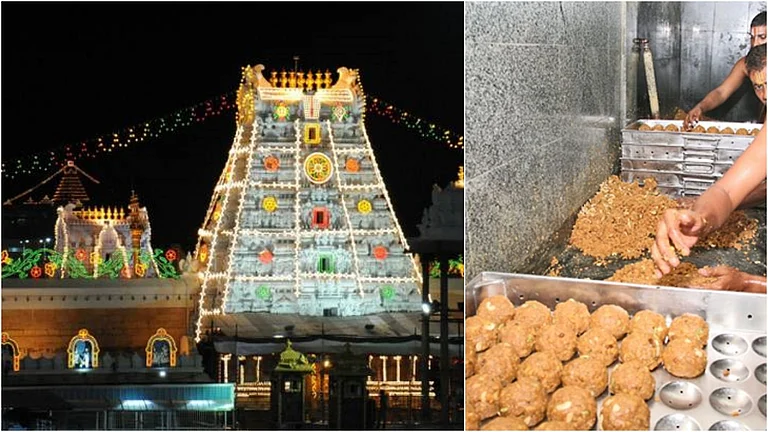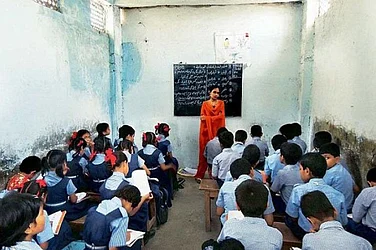The tradition of offering laddu to the Lord in the Sri Venkateswara Swami Temple located at the Tirumala hills in Andhra Pradesh's Tirupati district is a centuries-old practice which first began on August 2, 1715.
The prasadam, which devotees stand in long queues for, has become a focal point of an elongated controversy now, with Andhra Pradesh Chief Minister N Chandrababu Naidu alleged YSRCP government over the usage of substandard ingredients, animal fat, and fish oil in the laddu prasadam.
With the state government, political parties, Amul brand and the Supreme Court, the matter now has the involvement of several prominent bodies and persons.
What Did Lab Reports Say?
The lab report issued by the Centre of Analysis and Learning in Livestock and Food (CALF) under the centre-run National Dairy Development Board in Gujarat aligned with Naidu's allegations.
The report confirmed the presence of animal fat in the ghee that was used to make the famous Tirupati laddus, while suggesting that there was fish oil, beef tallow, lard in the ghee.
While Naidu slammed the Jagan Mohan Reddy-led YSRCP government for the use of such ingredients in the laddu, he maintained that now pure ghee was used and everything has been sanitised at the temple, leading to improved quality.

Divisive Politics, Concocted Story: YSRCP
The row which began with Naidu's claims and the lab reports was quick to snowball into a national-level controversy, given the sacred value attached to the Tirupati laddu.
As Naidu went all out on the YSCRP government, Rajya Sabha member YV Subba Reddy was the first one to come in defence for the party. Subba, who served as TTD's chairman for four years, noted that Naidu's allegations undermined the hallowed nature of the deity and hurt the sentiments of the devotees.
"It is unimaginable to even say that animal fat was used in the consecrated food offered to the deity and the laddus given to devotees. There is no other heinous attempt than alleging that animal fat was being used," said Subba.

Senior YSRCP leader and another former TTD chairman B Karunakar Reddy said that Naidu made such sacrilegious allegations for 'political mileage'.
Coming to shield his regime and the party from the firing over the adulterated products used in making the laddus, YSRCP president YS Jagan Mohan Reddy said that this was a matter of "diversion politics", calling the narrative to be a "concocted story".
Jagan said that the adulteration issue was taken up to divert the public attention from the state government's first 100 days of rule -- like the first 100 days of Modi 3.0 government. The former Andhra CM lambasted Naidu, saying he is such a person who will use God also for political gains.
"This is diversion politics. On the one hand, people are expressing their anger at Chandrababu Naidu's 100 days' rule. They are demanding what happened to their "Super six" (poll promises). Under these circumstances, in order to divert the public attention, this concocted story," Jagan said.
He asked whether it is far "to play with the sentiments of crores of devotees across the world".
Congress Jumps In, What Did Rahul Gandhi Say?
The Congress also did not fall behind in jumping in to react to the elaborate row, saying that if claims of "desecration" of the Tirupati laddu are right, a full-fledged enquiry must identify the guilty but, if they are wrong or motivated, millions of Tirupati devotees will not forgive those playing with their faith.
Until then, the grand old party's Pawan Khera said, 'it suits the BJP to allow polarising conspiracy theories to fly thick in the air in the election season".
Earlier, Andhra Pradesh Congress Committee (APCC) president YS Sharmila had hit out at the ruling Telugu Desam Party (TDP) and opposition YSRCP for allegedly indulging in 'heinous politics' over the Tirupati prasadam.
She called for a CBI probe to ascertain whether animal fat was really used to make the sweet.
Leader of Opposition in Lok Sabha Rahul Gandhi also broke silence over the matter and called for thorough investigation into the claims, asserting that authorities across the nation have to protect the sanctity of religious spaces.
In a post on microblogging site X, Rahul Gandhi said, "The reports about the defilement of the Prasad at Sri Venkateswara temple in Tirupati are disturbing." He noted that Lord Balaji is a revered deity for millions in the nation and across the world.
"This issue will hurt every devotee and needs to be thoroughly looked into. Authorities across India have to protect the sanctity of our religious spaces," Rahul added.
Temple Trust On Ghee Suppliers
Amid the spiralling row, the Tirumala Tirupati Devasthanams (TTD) said that ghee suppliers to the temple took advantage of the lack of in-house adulteration testing facility and no usage of outside facilities either.
TTD Executive Officer J Shyamala Rao said that lab tests revealed the presence of animal fat and lard (pig fat) in the chosen samples.
Rao said that the ghee quality has fallen drastically, adding that the suppliers took advantage of the deficiencies in the temple. The TTD executive officer noted that following the concerns raised by CM Naidu, suppliers were warned of blacklisting if they delivered poor quality ghee.
Later, when four truckloads of ghee were not found to be good quality, their samples were sent for analysis. This revealed that the samples were adulterated with Lard.
"All the four reports of samples gave similar results. So, we immediately stopped the supplies. And the blacklisting of the contractor was initiated and the procedure to impose penalties would also be initiated. Now, the legal process will start," Rao said.
Notably, LV Subrahmanyam, a former chief secretary of Andhra Pradesh and also a former executive officer of TTD, said that procuring ghee has always been a challenge for the temple body, especially due to the massive quantity of diary products required.
"A diary which has the capacity to procure up to 4,000 litres (of milk) per day can only bring that kind (quantity) of ghee for TTD's use. In many places, that is not possible, but at the same time they (vendors) always try to throw their hand in the ring and say that we will supply at a particular rate," Subrahmanyam told news agency PTI.
Since the cost of cow ghee is expensive, the former chief secretary subtly hinted that governments general opt for L1 (least cost) bidders to supply the material and this procedure could have led to the present day imbroglio.
During normal days, up three lakh laddus are required while during festive season, the requirement could go as high as five lakh laddus, compelling TTD to follow just in time mode of producing.
Centre Seeks Report, Food Minister Expresses Concern
Indeed, the snowballed controversy landed in the Centre's eyeline as well, with Union Health Minister JP Nadda seeking a report on the Tirupati laddu issue.
Nadda asserted that the matter would be examined by the Food Safety and Standards Authority of India (FSSAI), adding that suitable action will be taken. The FSSAI is a statutory body under the Union Ministry of Health and Family Welfare, which ensures adherence to all food safety norms.
Union Food Minister Pralhad Joshi also called for an investigation into the allegation, saying that whatever CM Naidu has said is a "matter of serious concern".
"A detailed inquiry is required and the culprit should be punished," Joshi told reporters.
Matter Reaches High Court, Supreme Court
The Andhra Pradesh High Court on Friday agreed to hear a petition filed by senior YSCRP leader YV Subba Reddy on September 25 over the Tirupati laddu.
Subba sought to file a lunch motion petition for unearthing the truth behind the alleged use of animal fat in Tirupati laddus. His arguing counsel, P Sudhakar Reddy, told news agency PTI, "Let this be investigated by a sitting judge of the High Court or let the High Court constitute a committee or let it be done by the CBI."
Sudhakar, who worked as the additional advocate general in the YSRCP regime, said that a person holding the chief minister's chair should not make allegations without verifying as they will hurt the sentiments of crores of Hindu devotees.
“When you make an allegation, we want the truth to come out... you cannot use Gods as your planks for mudslinging," Sudhakar added.
The matter further found its way up to the top court, Supreme Court of India, with a lawyer filing a petition that the act of allegedly using animal fat in the Tirupati laddus violates the fundamental Hindu religious customs and hurts the sentiments of countless devotees.
Reportedly, lawyer Satyam Singh -- in a letter petition to the Chief Justice of India DY Chandrachud -- the acts are in violation of Article 25 of the Constitution, which guarantees the right to freedom of religion, including the right to practice religious customs.
Ghee Supplier, Amul & Nandini
A Tamil Nadu-based company -- AR Diary -- that supplied ghee to the Tirupati temple said that their product samples have been duly cleared by authorities certifying its quality.
The spokesperson of the Dindigul-based firm told reports that only during the months of June and July they had supplied ghee to the Venkateswara Swami Temple.
"There has been no deviations at all," the spokesperson said. AR Diary was one of the several vendors who had supplied ghee to the temple.
"Our ghee is not being sent now to Tirupati temple. We don't send," the spokesperson said, adding that their products were available at all places and that these could be tested for quality.
In August 2023, the Nandini brand milk producer Karnataka Milk Federation (KMF) chairman Bheema Naik had alleged that the TTD was procuring low quality ghee. However, the then TTD executive AV Dharma Reddy had said that the temple body procures cow ghee only from those suppliers who pass the twin tests of uncompromising quality and least cost (L1 bidder) through a rigorous e-tender process, dismissing Naik's allegations.
He further said that KMF, which has never qualified as an L1 bidder, supplied ghee only once in the last 20 years, including its failure to deliver the consignment on time.
Fast forward to the present day, Gujarat-based national-level diary supplier Amul has issued an official statement, addressing social media posts that Amul Ghee was being supplied to the Tirupati Temple.
"We wish to inform that we have never supplied Amul Ghee to TTD. We also wish to clarify Amul Ghee is made from Milk at our state-of-the-art production facilities which are ISO certified. Amul Ghee is made from high quality pure milk fat," the statement read.
It further said that the milk received at Amul's diaries pass through stringent quality checks including adulteration detection as specified by the FSSAI.
"Amul Ghee is India's most trusted ghee brand for more than 50+ years and continues to be an integral part of Indian households. This post is being issued to stop this misinformation campaign against Amul," the statement added.
Police on Saturday also registered a case against seven social media platform 'X' users for allegedly spreading misinformation that the substandard quality ghee used for making the Tirupati laddus belong to the 'Amul' brand.
As per the FIR, these seven X handles spread misinformation with the intention of harming the reputation of the Anand-based Gujarat Cooperative Milk Marketing Federation (GCMMF).
The FIR, which was filed at the Ahmedabad cyber crime police station, was registered under Bharatiya Nyay Sanhita (BNS) Sections 336(4), 196(1)(a), which deals with forgery intending to harm the reputation of any party, and promoting enmity on grounds of religion, race, etc., respectively.
Provisions of the Information Technology (IT) Act were also invoked by the police, an official said.
Laddu Prasadam's Sanctity Restored
The Tirumala Tirupati Devasthanams (TTD) on Friday night said that the sanctity of the sacred laddu prasadam has been restored.
"The divinity and purity of Srivari laddu is unblemished now. TTD is committed to protecting the holiness of Laddu Prasadam to the satisfaction of all the devotees," the temple board said in a social media post.
While several have voiced concerns over the matter spiralling into a political blame-game, with Naidu's condemnation of the previous YSRCP-led regime in the state and Jagan's accusations on the Chief Minister, political power play is nowhere out of the imagery.

What Makes Tirupati Laddu Special
The tradition of offering laddus to Sri Venkateswara Swami began in 1715 and continues to be one of the most cherished, valued and famous practices of the religious place.
More than a decade ago, the Tirupati laddu was given the Geographical Indication (GI) Tag. A report said that nearly one crore pieces of the prasadam get sold every month, fondly purchased and gifted by citizens, politicians and celebrities alike.
There is such high demand for the sacred sweet that during last years 10-day Vaikuntadwara Darshan, 36 lakh laddus were sold.
In fact, former CM Jagan Mohan Reddy gifted laddus, Tirupati Balaji idols and other articles from the temple to Prime Minister Narendra Modi every time he visited Delhi between 2019 and 2024.
The official custodian of the Sri Venkateswara temple, TTD, dispatched over one lakh laddus in a cargo plane for the Pran Pratishtha of Ayodhya's Ram Mandir in January this year.
The laddu, which is exclusively made by Sri Vaishnavites, is made in 'potu', meaning the laddu making kitchen. As per temple inscriptions, TTD sources said that the sweet prasadam as called 'manoharam' in 1480.
The ingredients of the laddu include boondhi, jaggery syrup, almonds, cashew nuts, raisings, ghee, and others that lend the distinct aroma and flavour to the prasadam.

























